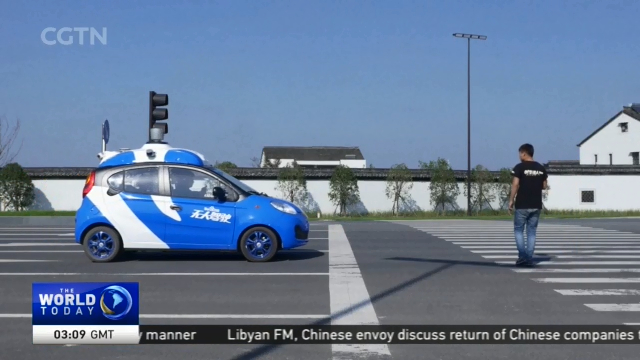
11:24, 14-Jun-2018
Autonomous Autos: Companies vie to lead the way
03:53

Self-driving cars have been a major part of the discussion for the next phase of new technology. They are seen as the next multi-billion dollar business. Our reporter Ge Yunfei reports.
Auto companies have been developing self-driving cars for years. But here in the Nansha District in China's southern city Guanghzou, a fleet of driverless cars have been already running on open roads for a half-year. This Lincoln MKZ is one of them.
REPORTER AND INTERVIEWEE IN GUANGZHOU SITTING IN A DRIVING "Under most circumstances, autonomous driving will make a better judgement than human beings."
ZHANG NING DIRECTOR OF ENGINEERING OF PONY.AI "Yes, First, the cars have a wider detection range. Like this one, our detection range can reach up to a diameter of 200 meters and 360 degrees. The Second is it can make quicker response. For instance, if a man suddenly appears before us, we can brake in 0.1 second, but for humans, the responsive time could be up to 1 second. Third, we'll never violate the traffic laws."
Zhang Ning said, in the past six months, their cars have an unbroken record of safe driving.
Since 2015, self-driving has been touted as the next multi-billion-dollar business in China.
Pony.ai is one of them. It's already a "unicorn"-a privately-held tech startup valued over a billion dollars.
ZHANG NING DIRECTOR OF ENGINEERING OF PONY.AI "Self-driving is a brand new area for all the players. Developing the traditional auto industry or computer chip industry needs lots of history accumulations. But, for self-driving, it doesn't."
Though the Chinese self-driving company is catching up fast, James Peng, the founder of Pony.ai admits a U.S. company is still ahead.
JAMES PENG FOUNDER, CEO OF PONY.AI "I think Waymo is leading the pack. There are two reasons. One is that they started earlier. Another is that they really invested a lot in terms of capital and employees."
Waymo is the former Google self-driving car project developed in Sebastian Thrun's pioneering research lab-Google X.
SEBASTIAN THRUN FOUNDER, CHAIRMAN OF UDACITY "The gap to Waymo is still there. But having been to China, I have to admit the driving situation in China is somewhat different. So, I think there is a unique opportunity in China that American companies cannot do."
The opportunity Thrun mentioned is the huge mass of data generated by China's 1.4 billion people.
JAMES PENG FOUNDER, CEO OF PONY.AI "For AI or autonomous driving, the biggest factor is all about talent. The main drive for us to have three offices is we go where talents are. Here in the silicon valley office, we have more senior and more experienced engineers."
The company just moved to a new office in Fremont. It'll triple the number of local employees to 200 researchers by the end of this year.
GE YUNFEI GUANGZHOU "The fever of AI is causing severe shortage of qualified talents worldwide. And a company in the silicon valley is dedicated to solving this problem."
Seeing the demand, Sebastian Thrun quit Google and founded Udacity five years ago. It's now providing the world's most extensive program to prepare for a career in self-driving cars. Udacity is offering courses working with big name Chinese and American companies, such as Google and Baidu.
SEBASTIAN THRUN FOUNDER, CHAIRMAN OF UDACITY "This program now has over 40,000 enrollments in total. We, Udacity, worked with Baidu, Didi, Alibaba and Tencent to develop local curriculum and also to place people in jobs in China."
That's still not enough to fill industry demand which has attracted Chinese companies here to recruit experienced AI talent. Ge Yunfei, CGTN, from Guangzhou and Silicon Valley.

SITEMAP
Copyright © 2018 CGTN. Beijing ICP prepared NO.16065310-3
Copyright © 2018 CGTN. Beijing ICP prepared NO.16065310-3